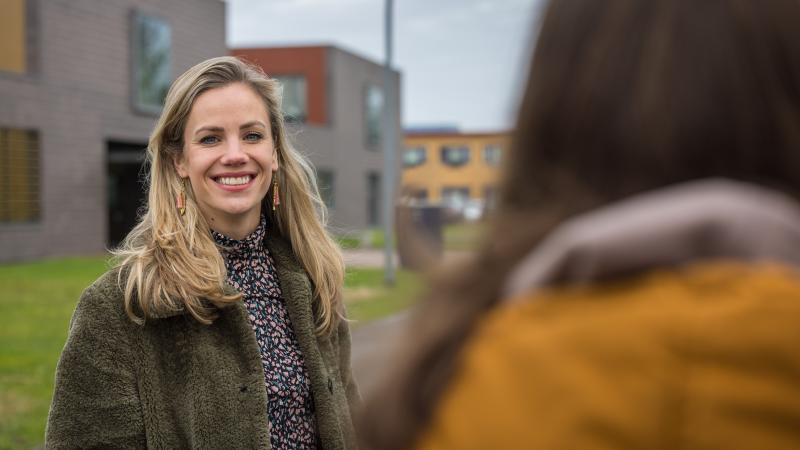My work is a grey area in which I have to take black-and-white decisions

My work is a grey area in which I have to take black-and-white decisions
Taking carefully considered decisions
One day, Carla speaks to an asylum seeker who is fleeing from the repressive regime in their country, the next to a refugee who is gay and afraid of persecution in his own country. Carla then has the task of asking the right questions and taking a carefully considered decision. ‘Once in a while itś easy,’ says Carla. ‘But usually it´s difficult. The foreign nationals must show that their asylum story is plausible. These are usually grey areas in which you as an IND staff member must take black-and-white decisions. No one can stay in the Netherlands “for a while”.’
Many opportunities to make a meaningful contribution
By now, Carla has alreay worked for the IND for 8 years. First at the application desk, later as an interview and decision-making staff member with several specialisations. ‘That is what is nice about the IND,’ says Carla. ‘There are so many opportunities to make a meaningful contribution. I haven’t been bored for a single day in all those years. This is because you notice changes in the world almost immediately at the IND. And you have to do something about them. That keeps the work interesting. If I had to carry out the same routine every day, I would quickly be tired of it.’
I am not a police officer
One of Carla’s specialisations is conversion coordinator. She is the contact person for her co-workers in Ter Apel who interview people who have converted to another religion. They are often afraid of reprisals in their own country. ‘These are very difficult cases,’ she says. ‘The foreign national in question must demonstrate why they are eligible for asylum because of their religious convictions. In this context, I have to keep in mind that many people make up a story to be able to stay in the Netherlands. So the interviews, during which I certainly ask critical questions, involve a bit of finding the truth. But I am not a police officer. That is also why it’s called an interview – not an interrogation.’
I assess whether a story is credible
Does she find it difficult to reject an application? ‘No,’ she says matter-of-factly. ‘I simply adhere to laws and regulations. I assess whether or not a story is credible, and whether someone is then eligible for a permit. Naturally, there is room for the human dimension and I take someone’s personal story into consideration. And I feel good about the fact that, at the IND, a legal representative always takes a final look at my decisions. And afterwards the judge. This doesn’t mean that I don’t feel responsible for the decisions I take, but I know that it´s not just up to me.’
The least I can do
As soon as a case is allocated to Carla, she tries to reach a carefully considered decision as soon as possible. ‘I prefer not to leave people in uncertainty for one more day more than necessary. Whether I grant or reject an application, I think that uncertainty is one of the worst things for foreign nationals. And make no mistake, sometimes they are lured to the Netherlands with the nicest stories, only to end up here in an austere reception centre and slow-moving asylum process. That does something to people. Then the least I can do is to take quick and careful decisions.’
We discuss dilemmas with one another
What if Carla has doubts about an application? ‘Then I always consult with my colleagues. Discussing dilemmas with one another is very important in this profession. Each case is different. We have laws and guidelines, but sometimes it’s still difficult to take a decision, because besides the law, we mustn’t forget about the human dimension.’ She looks back on a case that came back from the court last year. ‘According to the court, the IND had not taken the rejection decision on the right grounds. A new decision had to be taken, which meant that the foreign national also had to be interviewed again. When this woman was sitting across from me, I found that her story came across as very sincere and consistent. At the end of the interview I could already tell her that she would get a permit and was therefore allowed to stay in the Netherlands. I will never forget her reaction. It was one of those rare moments that I couldn’t keep my own eyes dry.’
A meaningful feeling
Carla sometimes feels ashamed of the long waiting times at the IND. ‘We work so hard here. And nevertheless, the staff shortage and high influx of asylum seekers often result in events overtaking us. I know that I can’t do much about this myself. But still, I am also complaints coordinator and I hear myself at times making the same excuses to a lawyer as before. This makes me feel bad. At the same time, I consider the IND a splendid organisation with exceptionally motivated people. A place where everyone can learn a lot and where there are numerous possibilities to develop yourself, with the feeling that you are doing something meningful as a bonus.’